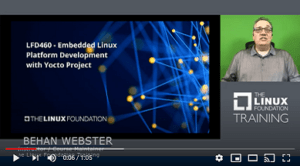In this instructor-led course, you’ll obtain a solid understanding of how to build a repeatable embedded Linux target using the Yocto Project. In addition to learning the build system, you will learn about more advanced tools like toaster, devtool, wic, eSDK, and eclipse IDE integration. This course builds on the Embedded Linux topics learned in the LFD450 class.
Embedded Linux Platform Development with Yocto Project (LFD460)



 Introduction
Introduction
- Goals
- Audience
- Who You Are
- The Linux Foundation
- Copyright and No Confidential Information
- Linux Foundation Training
- Certification Programs and Digital Badging
- Linux Distributions
- Platforms
- Preparing Your System
- Things Change in Linux and Open Source Projects
- Documentation and Links
 Preliminaries
Preliminaries
- Procedures
- Labs
 How to Work in OSS Projects **
How to Work in OSS Projects **
- Know Where the Code is Coming From: DCO and CLA
- Stay Close to Mainline for Security and Quality
- Study and Understand the Project DNA
- Figure Out What Itch You Want to Scratch
- Identify Maintainers and Their Work Flows and Methods
- Get Early Input and Work in the Open
- Contribute Incremental Bits, Not Large Code Dumps
- Leave Your Ego at the Door: Don’t Be Thin-Skinned
- Be Patient, Develop Long Term Relationships, Be Helpful
 The Yocto Project and OpenEmbedded
The Yocto Project and OpenEmbedded
- What is OpenEmbedded?
- The Yocto Project Family
- Yocto Project Terms
- Yocto Project Releases
- Resources
 Poky
Poky
- Poky and BitBake Concepts
- Yocto/OE Architecture
 Bitbake
Bitbake
- Metadata
- Metadata Layers
- Metadata Syntax
- Events
- Variants
- File Downloads
- Fetchers
- Built-in Default Metadata
- Checksums
- Event Implementation
- Tasks
- Project Layout
- Provisioning and Dependency Handling
- BitBake Command Line
- Labs
 Setting up the Yocto Project Build System
Setting up the Yocto Project Build System
- A. Poky Core Components
- B. OpenEmbedded-Core Metadata Layer
- C. Poky Metadata Layer
- D. Yocto Board Support Package (BSP) Layer
- Labs
 Building an x86 Emulation Image
Building an x86 Emulation Image
- Labs
 Troubleshooting Build Failures
Troubleshooting Build Failures
- Task Logs
- Running Specific Tasks
- Debug Statements
- Dependency Graphs
- Displaying Variables and Metadata
- Bitbake Debug Output
- Developer Shell
 Customizing Images
Customizing Images
- Inheriting from Core-Image
- Package Groups
- Using Image Features
- Labs
 Toaster
Toaster
- Dependencies and Set Up of Toaster
- Running Toaster (local)
- Remote or hosted Setup
 Adding Packages
Adding Packages
- Single C-File Package
- Makefile-based Package
- Autotooled Package
- Labs
 Layers
Layers
- Working with Layers
- Labs
 Kernel Recipes
Kernel Recipes
- Configuring the Yocto Project Kernel
- Building a Custom Kernel
- Extending the Yocto Project Kernel
- Labs
 Introduction to selected BBCLASSes
Introduction to selected BBCLASSes
- allarch.bbclass
- buildhistory and buildstats
- cve-check.bbclass
- archiver.bbclass
 Development Tools
Development Tools
- wic
 Licensing and Compliance
Licensing and Compliance
- License Tracking
- Enabling Commercially Licensed Recipes
- Labs
 Closing and Evaluation Survey
Closing and Evaluation Survey
 Kbuild System
Kbuild System
- Kbuild Makefiles
- Kconfig Basics
- Searching Kconfig
 Cross-Development Toolchain
Cross-Development Toolchain
- Built-in Linux Distribution Cross Compiler
- Linaro
- CodeSourcery
- crosstool-ng
- Buildroot
- OpenEmbedded
- Yocto Project
- Labs
 Booting a Target Development Board over Ethernet
Booting a Target Development Board over Ethernet
- An easier way to develop
- The Boot Sequence using TFTP and NFSroot
- Objectives of the Lab
- Labs
 Target Filesystem Packaging
Target Filesystem Packaging
- Directories: a Survey
- Embedded Filesystem Types
 Root Filesystem Choices
Root Filesystem Choices
- udev vs. BusyBox mdev
- Systemd
- C Library Choices
- Labs
 Right-Sizing
Right-Sizing
- Taking Inventory of Kernel Sizes











